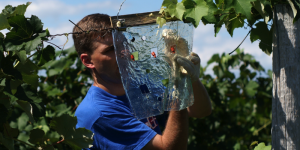
Vineyard in Finger Lakes showing symptoms of grape leafroll disease. This is part of a study looking at interactions between a grape virus and its principal insect vectors.
The overall goal of Professor Loeb’s research program is to understand the principal forces that influence species interactions involving plants, herbivores, natural enemies and more recently microbes with the specific applied goal of developing novel approaches to pest management with a focus on grapes and small fruit crops. Currently, considerable research effort is being directed at developing a better understanding of the biology and management of the invasive species spotted wing drosophila (Drosophila suzukii), a significant pest of soft-skinned fruit crops throughout much of North America and abroad. Projects include chemical ecology and behavior of host finding as basis for behavioral management, overwintering and spring biology, monitoring and decision making, interactions with microbes, including biological control with entomopathogens, mechanical control using netting, and optimizing chemical control. Other research projects ongoing in the lab include vector-pathogen interactions (e.g. grape leafroll disease and mealybug and soft scale insect vectors, fire blight in apples and interactions with insect vectors, sour rot in grapes and Drosophila) and understanding and enhancing ecosystem services (pollination and biological control) in strawberries. The program utilizes a number of different research tools to achieve objectives such as gas

Research Support Specialist Steve Hesler setting up synthetic lure for grape berry moth in a commercial vineyard in central NY
chromatography coupled with electroantennographic detection (GC-EAD) and GC-mass spectrophotometry, wind tunnel and other behavioral laboratory bioassays, growth chamber, greenhouse and field cage experiments and open field experiments on research and commercial farms. In addition, the lab has important collaborations with researchers within Cornell entomology and outside of the department and University.
